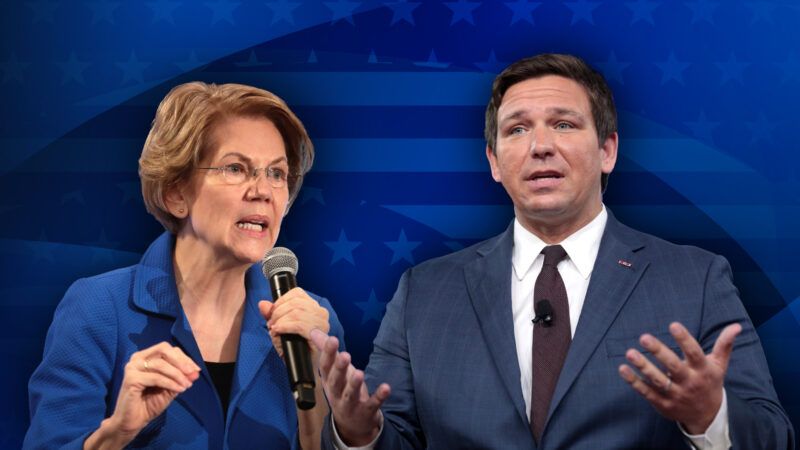Ron DeSantis Bullies Bud Light Like Elizabeth Warren Bullies Amazon
DeSantis talks a lot about freedom but increasingly only applies it to those who agree with him.

This week, amid a flailing campaign for the Republican nomination for president, Florida Gov. Ron DeSantis threatened to legally punish a beer company over its constitutionally protected speech. It's the sort of activity—micromanaging a private company using the coercive power of the state—we've long expected from big-government Democrats. And yet despite being completely contrary to traditional conservative principles, it's increasingly in fashion among Republicans as well.
In April, brewing company Anheuser-Busch InBev sent some personalized cans of Bud Light to TikTok influencer Dylan Mulvaney as part of a promotional campaign. Conservatives protested because Mulvaney is a transgender woman. Boycotts ensued, unseating Bud Light as America's most popular beer. In June, Bud Light sales were down 28 percent compared to the previous year, and the New York Post reported that AB InBev had lost $27 billion in value through the end of May.
In a letter to the State Board of Administration of Florida, which manages the state's retirement pension fund, DeSantis requested a formal "review" into AB InBev's "conduct." As DeSantis told Fox News' Jesse Watters, "We had over $50 million worth of InBev stock" in the state pension fund, and the dip in value impacted "hard-working people [like] police officers, firefighters, and teachers."
"We believe that when you take your eye off the ball like that, you're not following your fiduciary duty to do the best you can for your shareholders," DeSantis continued, "so we're going to be launching an inquiry about Bud Light and InBev" that could result in legal action. "At the end of the day," DeSantis cautioned, "there's got to be penalties for when you put business aside to focus on your social agenda at the expense of hard-working people."
Of course, AB InBev has worked with social media influencers for years. Its current financial woes singularly stem from a boycott over the fact that one of those influencers was transgender. DeSantis even contributed to the pile-on himself, telling conservative commentator Benny Johnson in April, "Pushback is in order. I'll never drink Bud again."
More to the point, it's particularly galling for DeSantis to threaten legal action against a private company for speech protected under the First Amendment. It's the sort of activity—micromanaging a private company using the coercive power of the state—we've long expected from Democrats like Sen. Elizabeth Warren (D–Mass.). In 2021, Warren called on the federal government to use its antitrust powers to break up Amazon for having the audacity to think that it could criticize her on Twitter. The following year, Warren said the feds should break up large grocery store chains, famous for their low profit margins, for "raking in record profits."
And yet despite being completely inimical to traditional conservative principles, Republicans are joining in on this trend as well.
Earlier this month, seven Republican attorneys general issued a warning to Target Corporation. The letter complained about the retailer's sale of "Pride" merchandise. Similar to Bud Light, conservatives boycotted Target for the sale and display of Pride-themed items online and in stores. Citing the company's 16 percent drop in stock price and $12 billion market loss, the A.G.s accused the company of violating its "fiduciary duties to its shareholders to prudently manage the company and act loyally in the company's best interests."
As First Amendment attorney and legal counsel at TechFreedom Ari Cohn wrote on his Substack, in language that could directly apply to DeSantis as well, the A.G.s are "using the coercive authority of the state to silence views they disagree with. Whether the states are shareholders is irrelevant…. State governments cannot simply purchase stock in a company and declare that they now have the right to threaten the company over their protected expression."
Unfortunately, for all DeSantis' talk about the importance of freedom, he's just as willing as any of his ideological opponents to weaponize state power to punish people who disagree with him. As Reason's Eric Boehm wrote in April, DeSantis is "not merely redefining freedom to mean something other than the absence of restrictions. It's an affirmative argument for those restrictions, wrapped in a promise that the right kinds of people…will continue to enjoy freedom even while it is denied to others."
As DeSantis competes to be the standard-bearer of the Republican Party—whose 2016 presidential platform declared, "We believe political freedom and economic freedom are indivisible"—it's worth keeping in mind that in his ideal world, each would be reserved only for those he favors.


Show Comments (205)